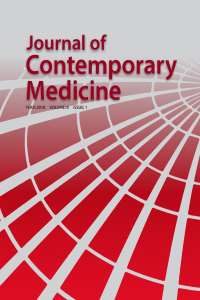COMPARISON OF LATERALIZATION THYROPLASTY AND LASER CORD WEDGE RESECTION IN TERMS OF VOICE QUALITY IN PATIENTS WITH BILATERAL ABDUCTOR VOCAL CORD PARALYSIS
COMPARISON OF LATERALIZATION THYROPLASTY AND LASER CORD WEDGE RESECTION IN TERMS OF VOICE QUALITY IN PATIENTS WITH BILATERAL ABDUCTOR VOCAL CORD PARALYSIS
Lateralization Thyroplasty Laser cordectomy, jitter, shimmer,
___
- 1. Holinger LD, Holinger PC, Holinger PH. Etiology of bilateral vocal cord paralysis. Ann Otol 1976;85;428-36.2. Kashima HK. Bilateral vocal fold motion impairment. Pathophysiology and management by transverse cordotomy. Ann Otol 1991;100:717-213. Tucker HM. Vocal cord paralysis etiology and management Laryngoscope 1980;90:585-904. Dedo HH. Recurrent laryngeal nerve section for spastic dysphonia. Ann Otol Rhinol Laryngol. 1976;85:451–459.5. Nakamura K, Yosida T, Tsukahara K, et al. Clinical feasibility of surgeries for adductor spasmodic dysphonia: complication between thyroarytenoid myectomy and type 2 thyroplasty. J Jpn Bronchoesophogol Soc. 2009;60: 231–239.6. Su CY, Chuang HC, Tsai SS, Chiu JF. Transoral approach to laser thyroarytenoid myoneurectomy for treatment of adductor spasmodic dysphonia: short-term results. Ann Otol Rhinol Laryngol. 2007;116:11–18.7. Woodman DG. A modification of the extralaryngeal approach to arytenoidectomy for bilateral abductor paralysis. Arch Otolaryngol 1946;43:63-58. Ossof RH, Karlan MS, Sısson GA. Endoscopic laser arytenoidectomy. Laser Surg Med 1983;293-9.9. Ossof Rh, Sısson GA, Duncavage JA. Endoscopic laser arytenoidectomy for the treatment of bilateral vocal cord paralysis. Laryngoscope 1984;94;1293-7.10. Isshiki N, Tsuji DH, Yamamoto Y, Iizuka Y. Midline lateralization thyroplasty for adductor spasmodic dysphonia. Ann Otol Rhinol Laryngol. 2000;109:187–193.11. Tucker HM: Etiology and management. Laryngoscope 90: 585, 197912. Jatko G, Lisborg B, Muller M, Wette V. Recurrent nerve paralysis after thyroid operations. Nerve identification and literature review. Surgery 1994;115: 139-143.13. Ada M, Öz F, Toprak M, Öktem F, Kaytaz A, Yağız C. CO2 laser arytenoidectomy in laryngeal microsurgery. Turkish ORL Archive. 1999;37:23-6.14. King BT. A new and functioning respiratory operation for bilateral abductor cord paralysis. JAMA 1939;112:814-23.15. Kelly JD. Surgical treatment of bilateral paralysis of abductor muscles. Arch Otolaryngol 1941;33:293-304.16. Eckel HE, Thumfart M, Wasserman K, et al. Cordectomy versus arytenoidectomy in the management of bilateral vocal cord paralysis. Ann Otol Rhinol Laryngol 1994; 103: 852-717. Thornell WC. Intralaryngeal approach for arytenoidectomy in bilateral abductor vocal cord paralysis. Arch Otolaryngol 1948;47:505-8.18. Tucker HM: The larynx. 2. Edition. Thieme medical publishers Inc. New York, 1993.19. Kirchner F. Endoscopic lateralization of the vocal cord in abductor paralysis of the larynx. Laryngoscope 1979;89:1779-1782.20. Carbon Dioxide Laser Endoscopic Posterior Cordotomy Technique for Bilateral Abductor Vocal Cord Paralysis JAMA Otolaryngol Head Neck Surg. 2013;139(4):401-404.21. Dennis DP, Kashima H. Carbon dioxide laser posterior cordectomy for treatment of bilateral vocal cord paralysis. Ann Otol Rhinol Laryngol 1989;96:930-4.22. Maurizi M, Paludetti G, Galli J, Cosenza A, Di Girolamo S, Ottoviani F. CO2 laser subtotal arytenoidectomy and cordotomy in the treatment of post-thyroidectomy bilateral laryngeal fixation in adduction. Eur Arch Otorhinolaryngol 1999;256:291-5.23. Hans S, Vaissiere J, Crevier-Buchman L, Laccourreye O, Brasno D. Aerodynamic and acoustic parameters in CO2 laser posterior transverse cordotomy for bilateral vocal fold paralysis. Acta Otolaryngol 2000;120:330-33524. Bakır S, Tuncer Ü. In patients with bilateral vocal cord paralysis results of endoscopic posterior Cordotomy. Dicle Med J. 2006;36:178-183.25. Ünsal E. Öksüzler Ö. Özbek C. Aygenç E. Çelikkanat S. Özdem C. Thornell technique in the treatment of bilateral vocal cord paralysis. Kbbbbc 15(1):7-11, 200726. Laccaurreye O, Paz EsCovar MI, Gerhart J, et al. Co2 laser endoscopic posterior partial transverse cordotomy for bilateral paralysis of the vokal fold. Laryngoscope 1999;109;415-8.
- Yayın Aralığı: Yılda 6 Sayı
- Başlangıç: 2011
- Yayıncı: Rabia YILMAZ
Buket MERMİT ÇİLİNGİR, Hülya GÜNBATAR
Hışıltılı Çocuğun Ayırıcı Tanısında, Boş Biberon Emmenin Neden Olduğu Chilaiditi Sendromu
İlknur BOSTANCI, Çiğdem ÜNER, Derya ERDOĞAN
Melih YÜKSEL, Halil KAYA, Faruk ÇAVDAR, Suna ERAYBAR ATMACA, Yeşim İŞLER
Unal BICAKCI, Yaşar ISSI, Beytullah YAĞIZ, Berat Dilek DEMİREL
Nöroleptik Malign Sendrom nedir? Tanı ve tedavi yaklaşımları
Mehmet BALTACIOĞLU, Çiçek HOCAOĞLU
Ayşe TALİ, Elif KARAHAN, Füsun CÖMERT
Mehmet BALTACIOĞLU, Çiçek HOCAOĞLU
Acil Servise Baş Dönmesi Şikayeti ile Başvuran Hastalarda Nörogörüntüleme Maliyeti
Ali KABLAN, Serhat KARAMAN, Nurşah BAŞOL
Dilek TEZCAN, Muhammet LİMON, Semral GÜLCEMAL, Sema YILMAZ
Analysis of Bed Use Performance of Pediatrics Clinics in Turkey
